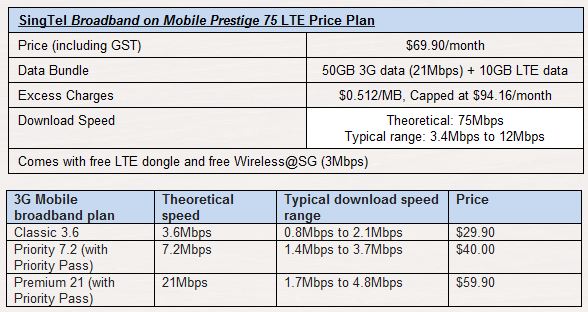SingTel is upping download speeds on the go on December 22, with a new mobile broadband service that promises up to 75Mbps with the new LTE or long term evolution technology.
The new service will be available at Singapore’s central financial district at launch, along with other high traffic areas like Orchard, City Hall, Marina Bay and Novena. By end 2012, SingTel expects to provide coverage for 80 per cent of users, and 95 per cent by end 2013.
Rival telco M1 had launched a limited LTE service earlier this year, but it offered this only to business customers. SingTel’s service is open to consumers as well.
The “red” telco predicts typical day-to-day speeds of between 3.4Mbps to 21Mbps, which will be good enough for video conferencing, whether users are at home or on the go.
For now, the limited service will only be available first on USB dongles that plug into laptops, though LTE phones and tablets have already been available in the US for close to a year now, and Samsung is said to be among the first to unveil an LTE version of the popular Galaxy S II here in Singapore in Q1, 2012.
The big problem for the telco would be the price. At S$69.90 a month, the LTE service can seem expensive to most users of its current 3.5G services, which cost from S$29.90 (up to 3.6Mbps) to S$59.90 (up to 21Mbps). M1’s service, by the way, costs S$59.40.
SingTel’s price is strangely structured as well. For S$69.90, users get 50GB of regular 3G data (up to 21Mbps) and 10GB of LTE data, according to the new Mobile Prestige 75 plan.
But do users know when they are using 3G and when they hop over to LTE? Fortunately, there is a cap of S$94.16 in terms of cost, so at least you won’t get a bill shock of a few thousand dollars.
Also to SingTel’s credit, it’s not calling the LTE service “4G”, as many American telcos have. 4G is defined, at least by the folks who work out wireless standards at the International Telecommunications Union, as a technology that offers 100Mbps downloads. LTE is what many would call pre-4G.
Here are SingTel’s prices, if you are thinking of hooking up to LTE:







I wonder what the frequency will be. I’m hearing, and witnessing a scary fragmentation scenario for LTE when it comes to a global standard. So many regions are using different frequencies, it’s insane. Even here in the states, the two major carriers that have already deployed some LTE, they’re using different frequencies. Mind blowing.